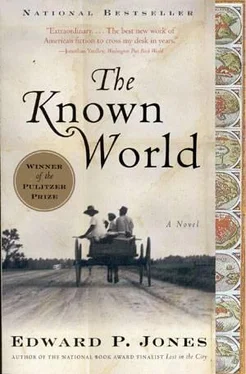John Skiffington had come to love and respect Patterson, but it took him less than a day to consider the suggestion from Robbins and Colfax that he become the new sheriff, that he, as Robbins put it, “take up the mantle.” Indeed, Skiffington believed he could be a better peacekeeper, given Patterson’s growing irascibility. Though his marriage was two years old, he and Winifred still considered themselves newlyweds; two years wasn’t even a full blink of God’s eye. Skiffington wanted a good life for his bride and he thought a sheriff’s life, and not that of someone’s deputy, would bring that. He felt he might make a reputation that he could carry to a greater job elsewhere, even to something in Philadelphia, where Winifred often said she wanted to return. A man he knew in Halifax County had gone from deputy to state delegate in less than a generation, less time than it took for a boy to grow into a man. Skiffington loved the South, but as a man with a woman from the North, he gradually became comfortable thinking he could live happy in Philadelphia or in any other part of the country and consider himself just another American who had become what he was because of what the South had given and taught him. Whenever he and Winifred visited his in-laws in Philadelphia, Skiffington never returned to the South without paying his respects to the place where Benjamin Franklin had died. He considered Franklin the second greatest American, after George Washington, and before Thomas Jefferson.
Though Manchester County had money for it, Skiffington did not at that time take on a deputy, having always thought that Patterson had taken him on as a favor to his father. He could do alone what needed to be done. But Skiffington, mindful of the Caesars who controlled all that did not belong to God, took a hint from Colfax and Robbins and assembled a team of twelve patrollers to serve as “nocturnal aides,” slave patrollers. He split Manchester County into three parts and appointed a nightly team of three men for each section. Except for one man who was Cherokee, they were all poor whites, the patrollers, and among them there were only two who had slaves to their names. One was Barnum Kinsey, then considered by everyone to be the poorest white man in the county, “saved,” as one neighbor said, “from bein a nigger only by the color of his skin.” Barnum’s only slave, Jeff, was fifty-seven when his master became a patroller; the slave had been part of his second wife’s dowry, along with five square yards of green silk that had wonderful golden lines running through it, silk so fabulous people said a person could get on it and ride away into the sun. Jeff died at sixty-two, after being unable to work for almost a year and after being cared for all that time by Barnum and his wife. Wherever he went after death, Jeff may have been grateful that in his last months, Barnum would read to him from Franklin ’s Poor Richard’s Almanac. “You have to stop all this funnin me with that book, Mr. Barnum,” Jeff would say, laughing. “You and that funny book will be the death of me.” After Jeff died, Barnum had to put his first child from that second marriage to work in his fields. The child was four at the time and by then all the magical green silk with golden lines had been sold off or used up. Sheriff John Skiffington was to say one day of Barnum Kinsey that he was a good man unable to practice in a place that could be hard on people with his kind of religion.
Despite vowing never to own a slave, Skiffington had no trouble doing his job to keep the institution of slavery going, an institution even God himself had sanctioned throughout the Bible. Skiffington had learned from his father how much solace there was in separating God’s law from Caesar’s law. “Render your body unto them,” his father had taught, “but know your soul belongs to God.” As long as Skiffington and Winifred lived within the light that came from God’s law, from the Bible, nothing on earth, not even his duty as a sheriff to the Caesars, could deny them the kingdom of God. “We will not own slaves,” Skiffington promised God, and he promised each morning he went to his knees to pray. Though everyone in the county saw Minerva the wedding present as their property, the Skiffingtons did not feel that they owned her, not in the way whites and a few blacks owned slaves. Minerva was not free, but only in the way a child in a family is not free. In fact, in Philadelphia years later, as she paid for all those posters with Minerva’s picture on them, Winifred Skiffington was to think only one thing-“I must get my daughter back. I must get my daughter back.”
In his day, the sheriff’s office sat next to the general store on Manchester ’s main street; it was moved to a larger facility across the street and next to the hardware store after the War between the States. Skiffington kept a Bible in the jail, on the northwest corner of his desk, and he kept one in his saddlebags. He found it a comfort knowing that wherever he might be, God’s word could be picked up and read. He turned twenty-nine the month he became sheriff. The town and the county went into a period of years and years of what University of Virginia historian Roberta Murphy in a 1948 book would call “peace and prosperity.” For the people who depended upon slaves, this meant, among other things, that not one slave escaped, not until after Henry Townsend died. The historian-whose book was rejected by the University of Virginia Press and finally published by the University of North Carolina Press -would also call Skiffington “a godsend” for the county. This historian was especially drawn to the quirks of the county. In 1851, she noted, for example, a man of two slaves at the eastern end of Manchester had five chickens born on the same day with two heads. Two of the chickens were even said to do a kind of dance when the harmonica was played. People came from as far away as Tennessee and South Carolina to see the five chickens for a charge of one penny. In the history of the county, the chickens, all of which managed to live until 1856, were a momentous event ten places below the tenure of John Skiffington as sheriff, according to this one historian, who became a full professor at Washington and Lee University three years after her book was published.
The Rita thing, which would ultimately bring Skiffington to the job of sheriff in 1843, began with Mildred and Augustus Townsend buying their own son Henry from William Robbins. Augustus and Mildred came to pick up their boy a few days after they made the last payment. They waited on the road that Sunday and about noon Rita, the second mother to Henry, came out with the boy. His groom clothes belonged to Robbins so he came out to his parents barefoot and in some secondhand clothes that Robbins had thrown in for free because the Townsends had never been late with a payment. There was nothing to do but for the boy to get into the back of the wagon after he and Rita had hugged good-bye. “I see you later, Rita,” Mildred said. “I see you later,” Rita said. “I see you later, Rita,” Henry said. What would amaze all involved was that Robbins never suspected the Townsends, and Henry, who became as close to Robbins as Robbins’s own son Louis, would never say a word. Rita came out into the road, which she knew she was not supposed to do, and stood with her arms folded when she was not waving bye-bye to the boy. The moment the wagon took off, she began to vomit, and all she could think, between the tears, was how much she had enjoyed that dinner, now lost to the road. And she vomited again-thinking that this time it was that little breakfast of one stolen egg and a slice of an old pig’s ear that would have been green in another hour or two if she hadn’t cooked it. She took the bottom of her frock and wiped her mouth. Being that it was noon, the sun was high. The sun for a moment went behind a cloud and when it emerged, she took a step toward the departing wagon. She wiped her tears and then she began to run, and in the moments it took for the sun to go behind another cloud, she had caught up with the wagon and had hold of the back of it. Augustus wasn’t driving the wagon very fast because he had his family together again and all time was now spread out before him over the valley and the mountains forever and ever. Henry soon took hold of Rita’s other hand. Augustus and Mildred were facing ahead, toward home. “Daddy,” Henry said quietly as he watched Rita. His legs dangling off the edge of the wagon, he alone was facing back, toward the Robbins plantation. “Daddy.” Augustus turned in his seat and saw Rita. “What you doin, woman?”
Читать дальше












